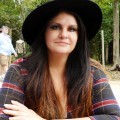Deborah Macgillivray has penned six award-winning novels and eighteen novellas and stories, which are translated worldwide in Russian, Japanese, German, French, Spanish and Portuguese, for Montlake Romance/Amazon Publishing, Kensington Books, Dorchester Publishing/Lovespell, and now Prairie Rose Publications. She writes Scottish Medieval Romances, Dragons of Challon™ series, and Paranormal Contemporary Romances, Sisters of Colford Hall™ series, and has her own anthology of cat romances, Cat O’ Nine Tales. Her novel, Riding the Thunder, picked up the Gayle Wilson Award of Excellence for Best Long Contemporary Romance of 2008. She currently lives in Kentucky with her husband and her beloved cats.
What other authors are you friends with, and how do they help you become a better writer?
Maggie Davis who wrote as Katherine Devereux, Lynsay Sands, Toni and Lori Karayianni (Tori Carrington), and Dawn Thompson. Sadly, the writing world has lost three of these very gifted authors too soon.
Dawn and I met through an RWA online chapter. We became very close friends until her death. We had fun holding hands, trying to make it. She was finally published by Dorchester Publishing in 2005. I was published by Kensington Books and Dorchester Publishing in 2006. Dawn expressed she had always wanted to write for Kensington. I introduced her to my editor at Kensington, Hillary Sares, who bought Dawn as well. I still miss her. She had such a joyful sense of humor, in spite of the pain and difficulty she lived with. She was grace under fire in any situation, and laughing all the way.
Lynsay Sands was the first to tell me she would do a cover quote for my book, and railed at me for not getting published. She said I was “gazillions better” than most writers, so I should just get it done. She clued me up how to deal with Chris Kessler at Dorchester, and when he told me to cut my book to 90,000 words, she insisted he put it back to 135,000 words, because cutting it would lose the charm. She sat and held my hand over Messenger through a long night, while she walked me through restoring my computer! She was better than any computer tech! And she was very generous with mentioning me when she was supposed to be talking about herself.
Maggie Davis was such a caring person. Smart, savvy, and one of the best wits I have come across. She used to have me in stitches, describing her family’s Christmas. When I grew sick with a horrible throat infection, she was sending me magnolia honey and grapefruits. She offered to edit my first novel. Most authors will barely give a cover quote, yet she was offering to polish my first manuscript. I truly appreciated the offer; it meant a lot, only I turned it down. She said, “You know any writer would jump at the chance to have a New York Times Bestselling author polish their first book.” I told her yes they would, and I was tempted. However, what happens to the second book? Third, if I am lucky? I knew I had to do it myself, or I didn’t earn the spot. I miss Miss Maggie so much!
Tony and Lori Karayianni came to me through the RWA contests. They judged The Invasion of Falgannon Isle in a contest. They took care in the judging, and then took a step more—they identified who they were and put a note at the end, “let us help you get this published”. Again, I appreciated the offer so much. I didn’t take them up on that, but they were kind enough to do quotes for Falgannon when it was published by Dorchester.
It’s so sad to lose so many special people in just a few years. Each taught me never to give up, and their friendship came at low points in my life, when I doubted if I would make it. I cannot thank them enough.
Do you want each book to stand on its own, or are you trying to build a body of work with connections between each book?
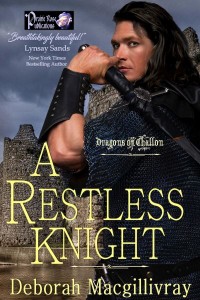 I currently have two series—Dragons of Challon (Scottish Medievals at Prairie Rose Publications now) and Sisters of Colford Hall (Comedic Paranormal Contemporaries at Montlake/Amazon Pub). I went in with both planned as series. Yet, in the same breath, I try to keep each book to have a stand-alone feel. People pick up books out of order, and often grumble they cannot find one book in the series. I set mine up to have the series connections, but you don’t feel frustrated for reading them out of order.
I currently have two series—Dragons of Challon (Scottish Medievals at Prairie Rose Publications now) and Sisters of Colford Hall (Comedic Paranormal Contemporaries at Montlake/Amazon Pub). I went in with both planned as series. Yet, in the same breath, I try to keep each book to have a stand-alone feel. People pick up books out of order, and often grumble they cannot find one book in the series. I set mine up to have the series connections, but you don’t feel frustrated for reading them out of order.
In fact, the Sisters series was actually set up with The Invasion of Falgannon Isle first. But the way I constructed them was all three books are running in the same time frame, so it wouldn’t matter which book was read first. It’s a bit trickier than it sounds, because you have to dovetail all three books to make sure when a character intrudes into the other storylines, that what they are doing in that book is reflected in the other two.
How do you select the names of your characters?
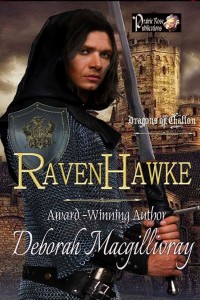 Names are a big thing with me. I always make sure the name fits the hero or heroine. The name is how you conjure them into life. They are generally the first thing a reader learns about your character, so it has to set the image of this man or woman in their minds. In Historicals, I make sure the name also fits the period. Nothing is more jarring than to see a name that wouldn’t exist in that time frame. I “collect” names. When I hear a first or last name that strikes me as interesting I will store it away for “down the road”. Old family records are another place I discover names. James is one heavily used in our family on both sides. But to my surprise, I found in old records Jago was Old English for James. When I saw that, I knew one day I would use that name for a hero. Oddly enough, I used it for a contemporary book, Riding the Thunder. Jago was such an honorable man, even when doing wicked things...lol. But the name told the readers that he was a modern day knight errant, and his steed was a Harley!
Names are a big thing with me. I always make sure the name fits the hero or heroine. The name is how you conjure them into life. They are generally the first thing a reader learns about your character, so it has to set the image of this man or woman in their minds. In Historicals, I make sure the name also fits the period. Nothing is more jarring than to see a name that wouldn’t exist in that time frame. I “collect” names. When I hear a first or last name that strikes me as interesting I will store it away for “down the road”. Old family records are another place I discover names. James is one heavily used in our family on both sides. But to my surprise, I found in old records Jago was Old English for James. When I saw that, I knew one day I would use that name for a hero. Oddly enough, I used it for a contemporary book, Riding the Thunder. Jago was such an honorable man, even when doing wicked things...lol. But the name told the readers that he was a modern day knight errant, and his steed was a Harley!
Do you hide any secrets in your books that only a few people will find?
Green Darkness. I get that from Dawn Thompson. She loved the story Green Darkness—the book that made her want to be an author. So, in every book that she published green darkness was used in a description—her tribute to Anya Seton. Since Dawn’s death I have continued to drop the phrase in my novels—my tribute to her.
Also, the character, Brishen Sagari (A Wolf in Wolf’s Clothing) is the great-great grandson of Dawn Thompson’s hero, Milosh (The Ravening). Both characters were Gypsy, so we thought it would be to fun to make them kin. Sadly, Dawn never got to see my book in print.
The cat in The Invasion of Falgannon Isle—The Cat Dudley—was a blend of three cats that belonged to my grandfather. The Cat Basil, The Cat Cyril and The Cat Nigel, marmalade tabbies who ruled the roost. He named The Cat Cyril after the cat in Martha Grimes’ Inspector Jury novels. When the other two came to stay, they got The Cat as part of their name as well.
What is your favorite childhood book?
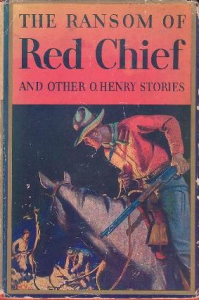 When I was very small, I loved a story by O’Henry—The Ransom of Red Chief. I thought it funny how the kid outfoxed the adults. For those who haven’t read it, think along the lines of the Home Alone movies.
When I was very small, I loved a story by O’Henry—The Ransom of Red Chief. I thought it funny how the kid outfoxed the adults. For those who haven’t read it, think along the lines of the Home Alone movies.
The other was To Kill a Mockingbird. I love the book so. My uncle gave me the novel. He came in one night and, tapped me on the head with the book, and said, “I think you will like this book.” He knew I was having trouble reading aloud. I have dyslexia, which was little understood at the time. They just knew I did everything mirror imaged when I wrote. Reading was slow. I could read, but making my mouth say what my brain saw took concentration. My teacher recommended reading aloud to someone each day over the summer vacation. Each evening, he sat down and listened to my faltering readings. Bless him! He was so kind and patient. When he came in the next summer to escort me back to family in England, the movie was out. I begged him to go see it at the Drive-in near us. It was the last night, before we would fly out in the morning. And it POURED rain. But we sat in the parking lot, the only car in the old Drive-in, with the windshield wipers going the whole time, just so I could see the movie.
How long on average does it take you to write a book?
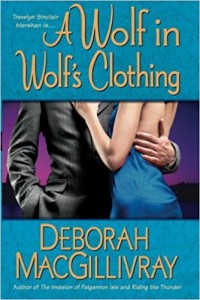 It varies. Generally about four to six months. But I wrote ninety percent of A Wolf in Wolf’s Clothing in nine days. I felt like I channeled that book! I was really sick at the time, and was just finishing a complete redo on In Her Bed. I was nearly done with it for Kensington, and we had a freak lightning strike in January that hit the house. It blew out four laptops and two external back up hard drives! I lost all copies of the novel. Fortunately, I had written the first two Challon novels by hand in 1980-81, so I was able to pull up the paper copy and rebuilt the novel. Only, I had not done work on Wolf at that point, so I had nine days to finish it. Fortunately, Chris Keesler loved it! I don’t think I slept much during that period! I can do 5000 words on a good day. I try to do 1000-2000 daily no matter what.
It varies. Generally about four to six months. But I wrote ninety percent of A Wolf in Wolf’s Clothing in nine days. I felt like I channeled that book! I was really sick at the time, and was just finishing a complete redo on In Her Bed. I was nearly done with it for Kensington, and we had a freak lightning strike in January that hit the house. It blew out four laptops and two external back up hard drives! I lost all copies of the novel. Fortunately, I had written the first two Challon novels by hand in 1980-81, so I was able to pull up the paper copy and rebuilt the novel. Only, I had not done work on Wolf at that point, so I had nine days to finish it. Fortunately, Chris Keesler loved it! I don’t think I slept much during that period! I can do 5000 words on a good day. I try to do 1000-2000 daily no matter what.
I wrote the first three chapters of The Invasion of Falgannon Isle by hand in six hours! I was discussing the series with Lynsay Sands, and she suggested I change it from straight romance to a comedic tone. She assured me I could do it. I saw she was right, so I sat down at 3am—writers are notorious night owls! —and redid the start of the book. I was so thrilled with the new direction I couldn’t stop writing. It was nearly 35,000 words in that session. My hand had to be ice packed the next day!!
Pen or typewriter or computer?
Do you write Alone or in public?
I can write both ways, but when I am forming things, I like to use a pen. I love to take materials to the Court House Square and sit in the gazebo and write. You would think with trains going by (the train runs down Main Street!) traffic, which can be noisy even for a very small Victorian town, and people coming and going, that it wouldn’t be a good spot to write. However, I get a lot of work done there. Writing by hand seems to anchor things. Once I have the anchor, then I move back to the laptop. I took two years of professional typing so I can type at 150 words per minute or more, thus laptops can out write pens and paper (and you don’t get calluses from laptops!).
Most of the time, I am writing at home. But never alone— you are never alone when you have cats in the house. Mouse Kitty generally is sitting on me watching. She feels it’s her job to manage me.
What do your friends and family think of your writing?
Hubby tends to ignore me. He cannot keep up with me writing for different publishers. When I mention having a book coming out with one publisher, he will look confused and say, “I thought you were writing for Amazon Publishing?” It’s a foreign language to him. Still, he is very supportive, ignores the laundry undone, or will come to check if I need food.
The rest of my family tends to accept as so? I come from a long line of writers and artists, thus it’s more unusual if someone is not creating in one venue or another. My grandfather was against me penning romances. He thought I should be writing non-fiction instead. After reading my first book, he became very supportive. I recall giving him my first Historical to read. I waited hours to hear what he thought. I finally went in to his study and he was sitting by the fireplace. A tear was in one eye, and he said simply, “You did good.” Yes, he knew it should be well. That was his private joke when one of the grandkids really did something that hit target. Very high praise from him. It made my day!
Does writing energize or exhaust you?
A bit of both. When I am in the zone and really ramping up the word count, it can be VERY exhausting. I recall the marathon writing of A Wolf in Wolf’s Clothing. I lost ten pounds! However, when you are on fire with a new story it can be very euphoric. It’s like a runner’s high, I suppose. Many times you cannot turn your mind off and it keeps driving you to write and write. In those times, I always recall The Red Shoes movie, where the ballerina puts on the red toe shoes and the shoes won’t let her stop dancing!
Music or silence?
Neither. Silence bothers me. My creative force is chaotic. I seem to thrive with moderate distraction. Music is a great mood maker. If you are happy, bouncing in spirit, and you play some tunes that are slow or sad, it will alter that mood. It’s a great way to drag your process down or alter it. Music makes me want to sing and dance—counterproductive for the author’s creative process. So I need noise, an eclectic mix of white noise (fan) and television. I thought I was odd, needing television, but I found my friend, Dawn Thompson, did the same thing. We both agreed you will need a film you have seen before. When you know what is coming up in the movie, you can slip and slide through the film. When you need to look away, for a moment of reflection you can watch a bit. Then, you can go back to writing and not need to know what happens in the film. I often just zone out a movie for nearly two hours, look up, and I am surprised it was over and another movie is in its place.

